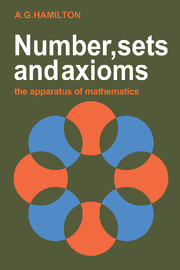6 - Ordinal and cardinal numbers
Published online by Cambridge University Press: 05 June 2012
Summary
Summary
The first section contains the definition and properties of von Neumann ordinal numbers. It is proved that every well-ordered set is isomorphic to a unique ordinal number. There is a discussion of uncountable ordinals. The second section describes in detail the process of definition of a function or sequence by transfinite induction, through the transfinite recursion theorem. Lastly, cardinal numbers are defined as alephs (initial ordinals), and some properties are derived, including properties of the arithmetic operations on cardinal numbers. There is a brief discussion of the generalised continuum hypothesis and of large cardinals and some of their properties.
Chapters 2 and 3 are prerequisites for this chapter. It is useful, but not essential, also to have read Chapters 4 and 5.
Well-ordered sets and ordinal numbers
We have already mentioned the idea of ordinal number, but it has so far been only an imprecise and informal notion. It has been ‘something’ which order isomorphic well-ordered sets have in common. We have also seen that ordinal numbers are associated with our so-called generalised counting procedures. In detailed study of the foundations of mathematics, indeed in the demonstrations of some of the results which we have already mentioned without proof in earlier chapters, ordinal numbers play an essential part, and it is necessary to be more explicit about what they are. Nevertheless, in a sense what they are is less important than the properties that they have.
- Type
- Chapter
- Information
- Numbers, Sets and AxiomsThe Apparatus of Mathematics, pp. 192 - 236Publisher: Cambridge University PressPrint publication year: 1983



